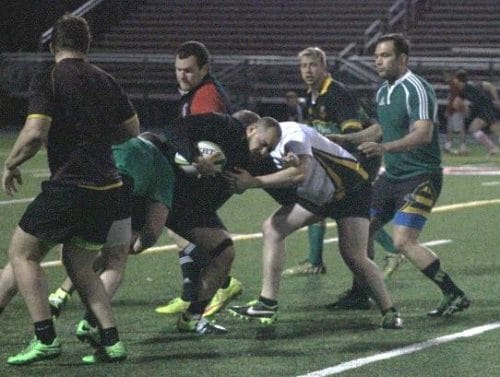
Rugby at Montclair State is not a NCAA sport, but is under the USA National Rugby Association.
Photo credit: Claudia Olsen
Rugby is a brutally physical sport with no padding, played by both men and women. Head injuries are a major concern for high-impact sports, but rugby has been in the clear so far due to the way the game is played, both around the world and right here at Montclair State University.
The issue of chronic traumatic encephalopathy (CTE) in football has been making headlines over the past few years. Brain injuries are becoming more and more relevant, with athletes suffering life-long medical problems due to head injuries and concussions sustained in game-play and practice. Although it may seem that rugby would have those same issues, it does not.
“We are taught how to go into contact and how to protect ourselves from contact,” said Montclair State Rugby Coach Dan Marian. “In American football, the helmet is like a weapon.”
Rugby players are taught how to hit without using their heads so injuries like concussions do not occur as often. “We get our concussions and stitches and stuff by its far few. I’ve seen one, maybe two very serious injuries in all my 19 years,” said Marian.
Rugby at the university is under the USA National Rugby Association, rather than the National Collegiate Athlete Association (NCAA), like most other Montclair States athletics. Since they are not a NCAA team, they do not get the same recognition as other sport teams on campus.
The Montclair State Rugby team was a Division III team and held their place within the top 10 teams in the country for two years in a row. After those two years, the team later moved up to Division II with much harder competition.
The Montclair State women’s rugby team consists of 20 athletes and practices once or twice a week, going over some of the same rugged and extremely physical exercises. Sophomore Paige Gallagher said, “I think it is safer, because we put our heads to the side of their body, and since we don’t have padding, we are more cautious.”
Gallagher went on to say, “We are taught to go from head to hip bone. When we wrap around them, you’re supposed to bring them down a certain way.”
All athletes have different reasons for starting their sport. Max Shirhall from the men’s rugby team said, “I’ve been wanting to play a university team sport, but they never fit into my schedule, because it was too time-consuming. Rugby is less time-consuming and works with my schedule.”
Shirhall also thinks rugby is somewhat safer than football. “There is no head-to-head hits like in football, where in that sport, it happens almost every other play.”
Coach Marian said he believes that there is a benefit to rugby being in the USA Rugby Organization rather than a NCAA sport because of all the requirements the NCAA calls for. The players and coaches have more control over the team rather than abiding to the numerous rules they would have to otherwise.
Rugby is not very well known throughout the campus, and Coach Marian said he thinks only 30 percent of the student population probably even knows a team exists. They get most of their players from word of mouth and through friends encouraging their friends to join the team.
That was the case for Montclair Rugby player Sean Clinedinst, “I didn’t know anything about rugby before playing. My friends played and convinced me to play too.”
Coach Marian said they have started a scholarship program hoping to encourage more students to play rugby and also to bring more recruits into the program.


